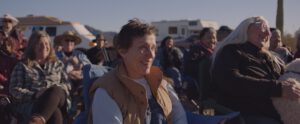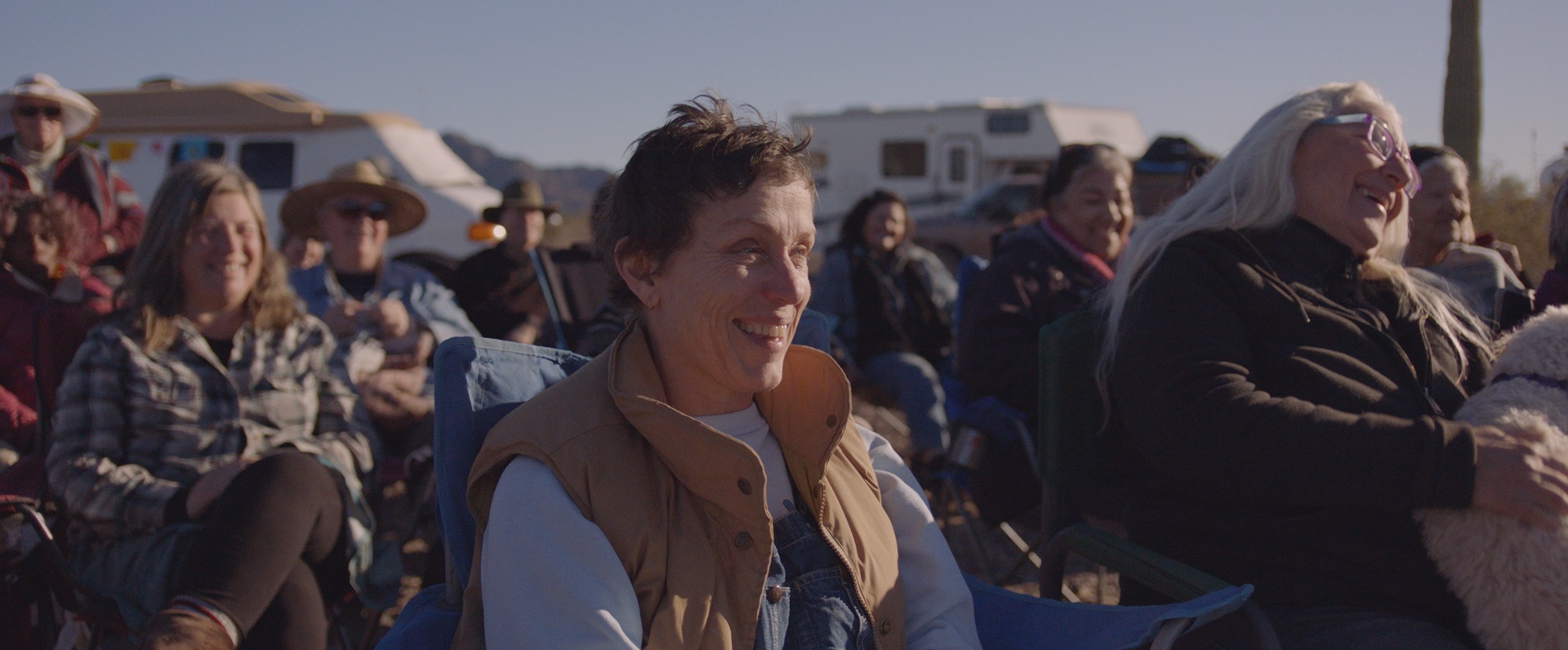Movie Info
Movie Info
- Director
- Chloé Zhao
- Run Time
- 1 hour and 48 minutes
- Rating
- R
VP Content Ratings
- Violence
- 1/10
- Language
- 2/10
- Sex & Nudity
- 1/10
- Star Rating
Relevant Quotes
When the priest takes the basket from your hand and sets it down before the altar of the Lord your God, 5 you shall make this response before the Lord your God: “A wandering Aramean was my ancestor…
Like a bird that strays from its nest
is one who strays from home.

Frances McDormand, optioning Jessica Bruder’s 2017 nonfiction book, Nomadland: Surviving America in the Twenty-First Century writer, made a wise choice when she joined forces with director/writer Chloé Zhao. The director memorably blends professional actors like McDormand and David Strathairn with nonprofessionals to provide a cinema verité feeling to this story of a blue collar woman forced by economic circumstances into the nomadic life of living in a van or RV. Like an elegy to a lost way of life, it is a tribute to the survival skills of seasonal workers and the subculture of those uprooted from stable homes.
Fern (McDormand) is widow who has known no other life but that of an employee of the United States Gypsum Corporation in Empire, Nevada until demand for its product, sheetrock, diminished because of the housing crisis. With the town emptied of people and herself alone due to the death of her husband, she decides to take to the road in a revamped van. In her early 60s, she discovers that her social security checks will not sustain her, so she finds holiday work at an Amazon fulfillment center. Linda May (played by a woman who is herself named Linda May, who lives on the road in real life), invites her to an upcoming Rubber Tramp Rendezvous.
Bob Wells (as himself) presides over the annual meet ups the Rubber Tramp Rendezvous, which he began in 2010 in Arizona and now attracts thousands of independent-minded folk tired of the consumer lifestyle, Fern declines, but then changes her mind. She finds herself enjoying the gathering where tips are traded and free classes on a wide variety of topics are offered. There is singing around campfires and taking in Bob Wells’ philosophy as he speaks:
“I think of an analogy as a work horse. The work horse that is willing to work itself to death, and then be put out to pasture. And that’s what happens to so many of us. If society was throwing us away and sending us as the work horse out to the pasture, we, work horses have to gather together and take care of each other. And that’s what this is all about. The way I see it is that the Titanic is sinking, and economic times are changing. And so, my goal is to get the lifeboats out and get as many people into the lifeboats as I can.”
As we see, Fern gladly climbs into that lifeboat and takes to the oars. She finds that she is not alone in that boat. At that gathering she also meets Bobby, who when they part says:
“ One of the things I love most about this life is that there’s no final goodbye. You know, I’ve met hundreds of people out here and I don’t ever say a final goodbye. I always just say, “I’ll see you down the road”. And I do. And whether it’s a month, or a year, or sometimes years, I see them again.”
Fern will discover he is right when she runs into a friend again.
Later, out on the road, Fern’s van blows a tire, which causes her to ask Swankie for help. After initially dressing her down for not being prepared for such an emergency, Swankie befriends Fern, and the two share their past. Fern learns that her benefactor has been diagnosed with cancer, but rather than spend her last days confined to a hospital, she decided to spend her final days on the open road. In one of their conversations we can see why Fern is so attracted to this sturdy woman, helping her to appreciate the world around them:
“ I’m gonna be 75 this year. I think I’ve lived a pretty good life. I’ve seen some really neat things kayaking all of those places. And… You know, like a moose in the wild. A moose family on the river in Idaho and big white pelicans landed just six feet over my kayak on a lake in Colorado. Or… Come around a bin, was a cliff and find hundreds and hundreds of swallow nests on the wall of the cliff. And the swallows flying all around and reflecting in the water. So, it looks like I’m flying with the swallows and they’re under me, and over me, and all around me. And little babies are hatching out, and eggshells are falling out of the nest landing on the water and floating on the water. These little white shells. That was like, it’s just so awesome. I felt like I’ve done enough. My life was complete. If I died right then, at that moment, would be perfectly fine.”
After they part ways, Fern finds a job as a host at an RV camp where she meets Dave (David Strathairn), whom she had met and dance with earlier. They enter into a relationship that includes caring for him during an illness requiring a hospital stay and working together at a restaurant, and more.
Fern’s adventures include a complete breakdown of her van and a visit to her sister Dolly (Melissa Smith) for a loan and some frank talk about their family. She meets up again with David who has settled in with his son to be close to his new grandson and is tempted by David’s offer to settle down with him there. There is much more, with Fern living and working in Nebraska, South Dakota, Nevada, Arizona and California. No big action scenes that would thrill fans of that genre, just the mundane occurrences of a hardy person who wants to be alone, and thus independent, but not too alone.
Fern’s encounters with similar-minded nomads of various stripes (as far as I can see all white) keep her connected, with new friendships at new camps or worksites, and old ones revisited ever so often. She finds out about the fate of Swankie when she pays a visit to her commune, and she returns to Empire for a last view of her former home and mine, now deserted. It might have been economics that triggered Fern’s nomadic life, but she refuses to be regarded herself as a victim, telling a young woman, “I’m not homeless, I’m just houseless. Not the same thing, right? Don’t worry about me.”
Fern and her fellow nomads enjoy both their sense of independence and their encounters with other nomads. As I thought of her, the words came to me of the ancient Hebrew creed from Deuteronomy that honors Abraham, “A wandering Aramean was my ancestor.” Her sister Dolly, during their heart-to-heart talk, looks to a more recent historical heritage, “You know, I think that what the nomads are doing is not that different than what the pioneers did. I think Fern’s part of an American tradition.”
Francis McDormand has so entered into the world of the real-life nomads she meets that there seems to be no difference between actress and no mad. In her encounter with Swankie, we can feel her love and wistfulness as she says:
“I’ve been thinking a lot about my husband, Bo. When it got really bad at the end, they had him in the hospital on morphine drippin’. I was sitting there at night in the hospital. And… I’d wanna put my thumb down on that morphine drip just a little bit longer. So I could let him go. Maybe I should’ve tried harder. So he could’ve gone sooner without all that pain.” Swankie replies,” Maybe he wouldn’t have wanted that. Maybe he was trying to stay with you as long as he could. I’m sure you took good care of him, Fern.” Fern says softly, “I did.”
Thanks to this film we are allowed a brief glimpse of a subculture we would otherwise never know. It is a subculture that includes pain as well as warm companionship, as Fern’s encounter with Linda attests:
“Before I moved into this squeeze inn, I was out looking for work and putting in applications. 2008, and it was just tough. I got to a really really low point. And I thought about suicide. And I decided I was gonna go buy a bottle of booze, turn on the propane stove, and I was gonna drink that booze until I’m passed out. And if I woke up, I was gonna light a cigarette and I was gonna blow us all up. And I looked at my two sweet little trusting dogs, my Cocker Spaniel and my little Toy Poodle. And I… I just couldn’t do that to them. And I thought, well, I can’t do that to me either. So I was getting close to 62 and I went online to look at my social security benefits. It said $550. Fern, I have worked my whole life. I’ve worked since I was 12 years old. Raised two daughters, I couldn’t believe it. So I’m online and I find Bob Wells’ cheap RV living. I could live in a RV. Travel. And not have to work for the rest of my life.”
These are people whose stories deserve an audience, and I hope, partially due at first to the Oscar buzz about Ms. McDormand’s performance, this film will attract one. Viewing this film made me seem like a privileged guest sitting with these folks around their campfire or at their laundromat. I think you will feel this too.
This review will be in the February issue of VP along with a set of questions for reflection and/or discussion. If you have found reviews on this site helpful, please consider purchasing a subscription or individual issue in The Store.

